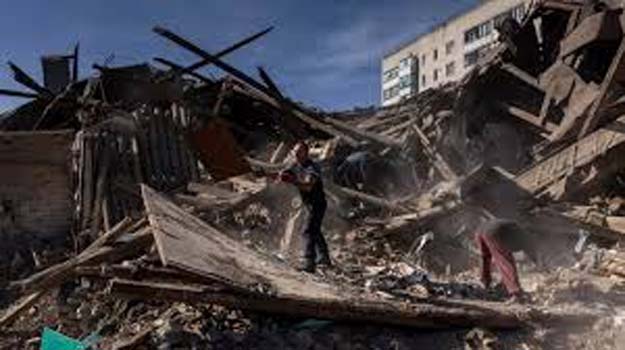In a nocturnal assault, Russian forces launched missiles and drones targeting the Kyiv region and five other territories in Ukraine, officials disclosed on Wednesday, ushering in a period of heightened diplomatic engagements amidst the third year of the ongoing conflict.
Reports from Ukraine’s air force indicate a remarkable feat as they successfully intercepted 29 out of 30 aerial threats, including four cruise missiles, one Kinzhal ballistic missile, and 24 Shahed drones, with several injuries reported among civilians.
President Volodymyr Zelenskyy commended the air force’s swift response, hailing it as a daily triumph. He persistently implored Ukraine’s Western allies for heightened air defense support, with the United States affirming late Tuesday its commitment to dispatch an additional Patriot missile system, according to two US officials.
The focal point of upcoming international discussions will revolve around devising effective means to bolster Ukraine’s resistance against Russia’s ongoing incursion.
Ukraine’s valiant yet outnumbered forces are engaged in a fierce struggle against the formidable Russian military, seeking to exploit vulnerabilities within Ukrainian defenses. Recent months have seen Ukraine grappling with shortages in manpower, ammunition, and aerial defense capabilities, exacerbated by Kremlin-backed attempts to destabilize the national power grid and penetrate eastern frontlines.
Military strategists predict Ukraine must endure the onslaught through the summer, emphasizing the urgent need for troop reinforcement, fortification construction, and expeditious delivery of Western military assistance to position Kyiv for potential counteroffensives by 2025.
Top leaders from the Group of Seven affluent democracies, including US President Joe Biden, are set to convene in Italy on Thursday for their annual summit, with a primary agenda to explore avenues for leveraging frozen Russian assets to channel additional financial support to Ukraine.
Simultaneously, defense officials from the US, Europe, and allied nations will convene in Brussels under the stewardship of US Defense Secretary Lloyd Austin to deliberate on addressing Ukraine’s evolving security imperatives.
Subsequently, representatives from nearly 90 countries and organizations, predominantly European, will gather for a Swiss-hosted Ukraine peace summit over the ensuing weekend, conspicuously absent of Russian participation.
In a bid to sustain military capabilities, both warring factions have courted international allies for logistical support. The conflict, marking Europe’s most significant upheaval since World War II, has exacted a heavy toll in lives lost, including innocent civilians.
While Ukraine has sought solidarity from Western nations, Russian President Vladimir Putin has sought strategic alliances with nations like Iran and North Korea. Speculation mounts regarding a potential third summit between Putin and North Korean leader Kim Jong Un.
The frontline skirmishes, spanning approximately 1,000 kilometers, have recently intensified in the partially occupied Donetsk region of eastern Ukraine, where Russian forces endeavor to seize strategic locales such as the hilltop city of Chasiv Yar.
Recent military maneuvers also saw Russian forces launching an incursion into the northeastern Kharkiv region, bordering Russia, purportedly to establish a buffer zone against Ukrainian incursions. Ukrainian Commander-in-Chief Oleksandr Syrskyi divulged on Wednesday via the Telegram messaging app that Russian units encountered staunch resistance in Vovchansk, impeding their progress.









